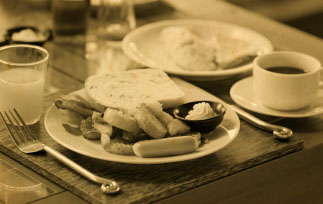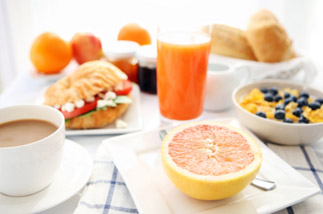
Breakfast - It's Been Around Longer
Than You Think
Would you be able to tell your child the story of the first breakfast man ever ate, or John Harvey Kellogg’s lucky accident that gave birth to the Corn Flake? Probably not. Yet the story of breakfast is a long and complex tale that spans continents and millennia – all because one Neolithic man decided that it’d be a good idea to start the day with a hearty meal in his stomach.
 Our tale begins in the Neolithic era – many, many years ago. At a time when man was already growing the same cereals that are now used to make so many of today’s breakfast products. Back then, stone querns were used to grind grains to make a sort of porridge.
Our tale begins in the Neolithic era – many, many years ago. At a time when man was already growing the same cereals that are now used to make so many of today’s breakfast products. Back then, stone querns were used to grind grains to make a sort of porridge.
Porridge was also a staple of Roman soldiers’ diets – they called it pulmentus. Indeed, we can thank the Romans for the word breakfast, which comes from the Latin disjejunare, meaning to break the fast, begun the night before when going to bed. The word was later contracted to disnare or disner in Old French, which eventually became dinner in English. So the word dinner actually means breakfast.
Making Time for Breakfast
Some breakfast ideas
As practicing dietician Judith Liddell says “Making time for breakfast is a simple, but very significant step towards good health. A nutritious breakfast means a good start to the day – it’s an easy way to improve your daily diet and to make sure that you get the right nutrition at the start of every day. It can also help prevent or delay mid-morning snacking which might not be so healthy, and can improve early morning concentration levels. What’s more, isn’t it simply relaxing and pleasurable to sit down at the breakfast table and enjoy the first meal of the day?”
It only takes a couple of minutes to prepare breakfast – cereals are very quick and convenient, as are cold cuts or boiling an egg. But why not add a bit of variety to your breakfast routine by taking inspiration from your fellow Europeans and trying different kinds of breakfast from across Europe? We’ve listed two that we particularly like – why not give them a go yourself when you have the time? You’ll taste the difference!
 Alpine Breakfast
Alpine Breakfast
- Glass of apple juice
- Bowl of muesli with low fat milk
- Crispy roll or brioche with a slice of cheese
- Alpine strawberries
- Hot Chocolate made with low fat milk
Nutrition Notes:
 Alpine Breakfast
Alpine Breakfast
DID YOU KNOW?
Eating a bowl of muesli, oats or granola will provide you with at least 25% of the fibre you need each day. Oats are a good source of protein, vitamins, minerals and fibre, and may support heart health.
DID YOU KNOW?
Bread and breakfast cereals are rich in carbohydrate which supply your body with long-lasting energy.
DID YOU KNOW?
Strawberries are a great source of fibre, vitamin C and manganese – all essential nutrients for good health.
Scandinavian Breakfast
- Glass of orange juice
- Bowl of wholegrain cereal with low fat milk
- Frukostgifflar (breakfast roll) with low fat spread and jam
- Pickled herring
- Handful of dried fruit
- Herbal tea
Nutrition Notes:
DID YOU KNOW?
Wholegrain breads and cereals, and the dried fruit, are excellent sources of fibre. Fibre is important for supporting bowel health and heart health.
DID YOU KNOW?
Herring is a good source of long chain omega-3 fats which support heart health.
HEALTHY ADVICE
Start the day with orange juice, which provides vitamin C and folate.
Juices with pulp tend to contain powerful antioxidants called flavonoids.
Antioxidants mop up the free radicals that contribute to chronic diseases.
Eastern European Breakfast
- Glass of grape juice
- Bowl of high fibre cereal with summer fruit compote
- Omelette with tomatoes and a slice of bread
- Coffee
Nutrition Notes:
DID YOU KNOW?
Fruit juice, fruit, vegetables, and fortified breakfast cereal all contribute greatly to the daily recommended intake for vitamins, minerals and fibre.
DID YOU KNOW?
Eggs are a good source of protein, while tomatoes are a rich in an antioxidant called lycopene.
DID YOU KNOW?
Breakfast cereals and bread provide slow release carbohydrate which helps to maintain energy levels and concentration throughout the day
